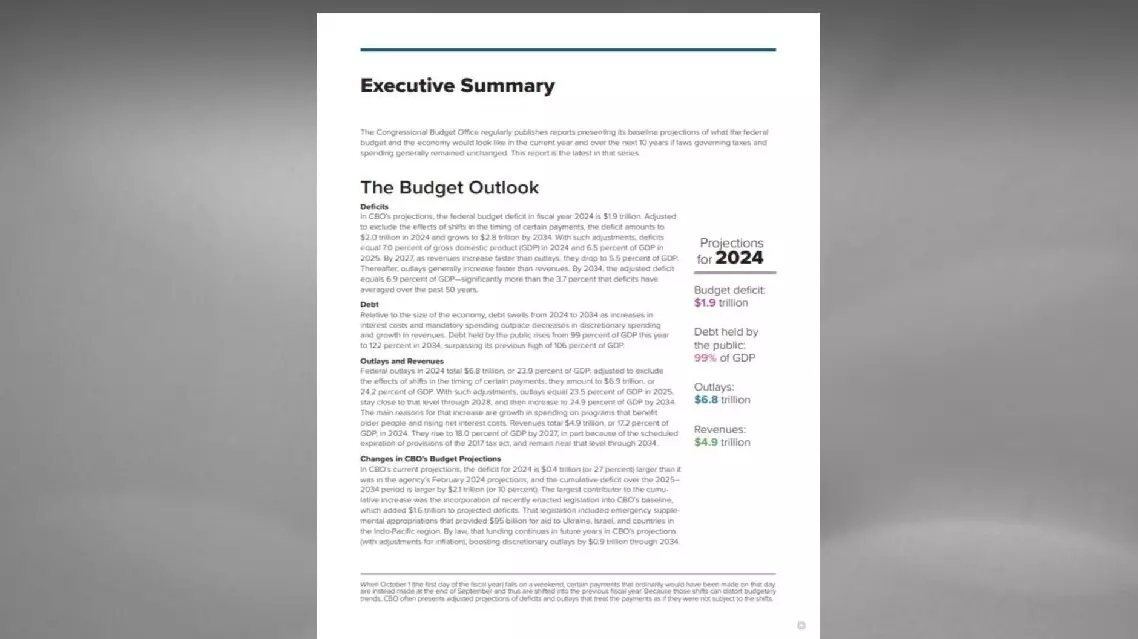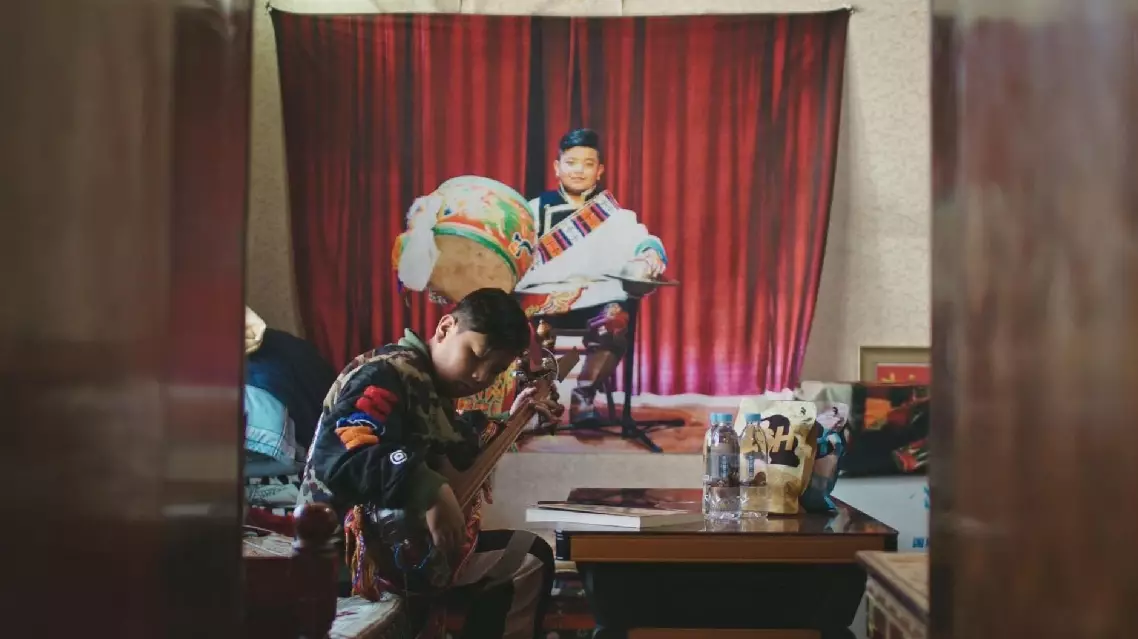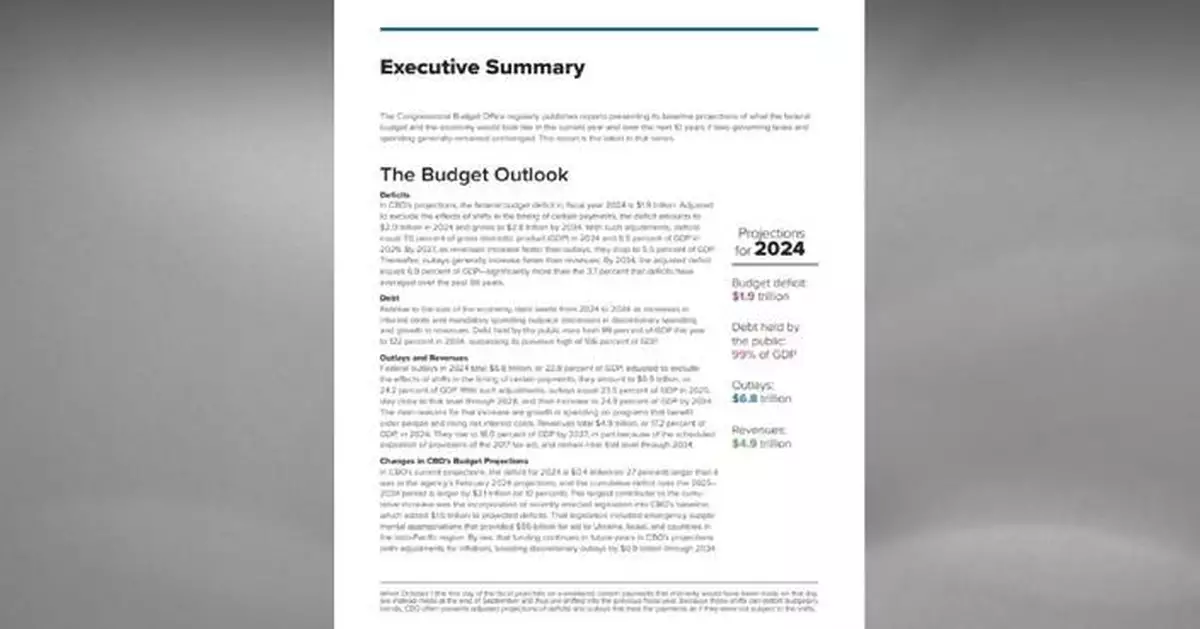The U.S. federal government's budget deficit for the fiscal year 2024 is projected to reach 1.9 trillion U.S. dollars this year, according to a report released by the Congressional Budget Office (CBO) on Tuesday.
The report said that the federal government's budget deficit for fiscal year 2024 has been revised upward by 27 percent compared with the February forecast. Additionally, cumulative deficits from 2025 to 2034 are also forecast to increase significantly.
Factors driving the upward revision in forecasts include increased foreign military assistance, student loan relief, and higher deposit insurance expenditures.
In addition, U.S. debt is expected to balloon from 2024 to 2034. The portion of debt held by the public as a percentage of gross domestic product (GDP) is projected to rise from 99 percent this year to 122 percent by 2034, surpassing the previous peak of 106 percent.
Meanwhile, the CBO predicted that U.S. economic growth will slow from 3.1 percent in 2023 to 2.0 percent in 2024. The inflation rate is expected to decrease from 2.7 percent in 2024 to levels roughly consistent with the Federal Reserve's long-term target of 2 percent by 2026 and stabilize thereafter.
On the same day, the Peterson Foundation of the United States stated in a release that the report from the U.S. CBO once again demonstrates that the "U.S. is on an unsustainable and dangerous fiscal path".
If not addressed, the structural mismatch between federal spending and revenue, along with rising interest rates and federal borrowing costs, will pose challenges to the federal budget, the U.S. economy, and the nation's future.
Michael Peterson, CEO of the Peterson Foundation, said that the report from the U.S. CBO indicates that the outlook for the severe challenges facing U.S. national debt is worsening.

US federal budget deficit to reach 1.9 trillion dollars in 2024
With dramyin lute and cymbals in hand and dressed in colorful traditional costume, 17-year-old Tenzin Norbu is among the proud youngsters in southwest China's Xizang Autonomous Region who have been helping preserve the centuries-old Tibetan opera, a multifaceted representative of Tibetan art and cultural heritage. Considered a living fossil of Tibetan culture, Tibetan opera is a comprehensive art combining folk songs, dance, storytelling, chant, acrobatics and religious performance. It was included on the UNESCO Representative List of the Intangible Cultural Heritage of Humanity in 2009.
Tenzin grew up listening to Tibetan opera along with his grandmother. The beat of the drum marked the rhythm of his childhood and quietly planted the seed of a dream.
The teenager leads a youth Tibetan opera troupe and guides his peers onto the very stage they once only dreamed of. He named it "Phudor Youth Tibetan Opera Troupe", because "Phudor" means "dream" in the Tibetan language.
"There are about 24 members in the troupe," said the teenager.
Tenzin once received a very special invitation to perform Tibetan opera for the opening ceremony of an art festival in Lhasa.
Although both their parents and teachers felt it's important for the children to be exposed to traditional culture from a young age, they didn't want it to affect their schoolwork.
The performance they were getting ready for was the first Sweet Tea House Art Festival, the troupe's very first public appearance. It's a rare opportunity for the children -- one too precious for them to pass up. But with their parents growing anxious about preparation for the performance eating into valuable study time, the children opted to rehearse in secret at weekends. Tenzin's family runs a tailor's shop. His father, who is hearing- and speech-impaired, is a superb tailor, while his mother helps him out by dealing with customers. Tenzin enjoyed Tibetan opera with his grandmother during childhood and later learned more about it from his uncle.
"Whenever I'm not feeling good, I'll take out the dramyin lute and the cymbals. When I hear the drumbeat, I get a feeling of elation that's simply indescribable," he said.
When Tenzin finally stepped onto the stage at the festival, he noticed that his parents were not in the audience. "My parents didn't have time to come to see my performance. But they always support me. They work hard every day, also for my sake. So, I'm happy whether they were here or not as long as I can keep performing Tibetan opera," said the youngster, believing that his passion for Tibetan opera will last a lifetime.

Childhood dream takes local boy onto Tibetan opera stage






















































